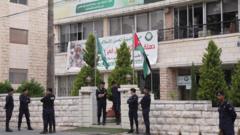Authorities in Istanbul deployed 50,000 police officers to prevent May Day protests, resulting in hundreds of detentions and restrictions on access to Taksim Square, the historic site for labor demonstrations. Activists and international rights groups criticize the government's heavy-handed response to peaceful demonstrations.
Istanbul Sees Mass Arrests Amidst May Day Protests Crackdown

Istanbul Sees Mass Arrests Amidst May Day Protests Crackdown
In a significant show of force, Turkish authorities ramped up their crackdown on May Day protests in Istanbul, leading to widespread arrests and heightened tensions.
In a severe security operation on International Labour Day, the streets of Istanbul were filled with police as authorities aimed to prevent gatherings typically associated with May Day. A staggering 50,000 police officers were mobilized, leading to the arrest of hundreds of individuals and instilling fear among protesters and citizens alike.
Public transport was halted in an attempt to restrict movement towards Taksim Square, the traditional focal point for protests, which has been under a ban since 2013. The atmosphere was charged, with video footage displaying violent encounters between riot police and demonstrators. Witnesses described the oppressive environment, with one student remarking on the state of emergency-like conditions that restricted access to the square.
In stark contrast to its usually lively ambiance, Taksim Square appeared deserted, with shops and restaurants closed off. Metal barriers and police units surrounded the area, allowing only a small number of labor union activists to momentarily display their banners before being tightly monitored. Even tourists were seen confused and disoriented, struggling to navigate the heavily policed area.
The tensions escalated following the recent arrest of opposition mayor Ekrem Imamoglu, who has been accused of corruption—charges he claims are politically motivated. This incident reignited public outrage, funneling thousands into the streets earlier this spring in support of Imamoglu, viewed as a formidable opponent to President Recep Tayyip Erdogan ahead of the critical 2028 elections.
Human rights groups, including Amnesty International, sharply criticized the government's actions, voicing concerns over the violent suppression of peaceful protests. They assert that the justification for the crackdown is rooted in unfounded claims of security threats. As Istanbul's political landscape grows increasingly polarized, many fear the implications of Erdogan's prolonged hold on power and the diminishing space for dissent in Turkey.
Public transport was halted in an attempt to restrict movement towards Taksim Square, the traditional focal point for protests, which has been under a ban since 2013. The atmosphere was charged, with video footage displaying violent encounters between riot police and demonstrators. Witnesses described the oppressive environment, with one student remarking on the state of emergency-like conditions that restricted access to the square.
In stark contrast to its usually lively ambiance, Taksim Square appeared deserted, with shops and restaurants closed off. Metal barriers and police units surrounded the area, allowing only a small number of labor union activists to momentarily display their banners before being tightly monitored. Even tourists were seen confused and disoriented, struggling to navigate the heavily policed area.
The tensions escalated following the recent arrest of opposition mayor Ekrem Imamoglu, who has been accused of corruption—charges he claims are politically motivated. This incident reignited public outrage, funneling thousands into the streets earlier this spring in support of Imamoglu, viewed as a formidable opponent to President Recep Tayyip Erdogan ahead of the critical 2028 elections.
Human rights groups, including Amnesty International, sharply criticized the government's actions, voicing concerns over the violent suppression of peaceful protests. They assert that the justification for the crackdown is rooted in unfounded claims of security threats. As Istanbul's political landscape grows increasingly polarized, many fear the implications of Erdogan's prolonged hold on power and the diminishing space for dissent in Turkey.

















